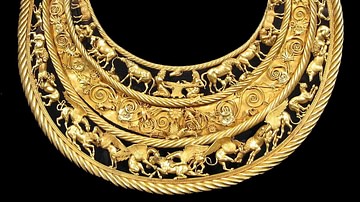Search
Search Results

Definition
Indo-European Languages
The Indo-European languages are a family of related languages that today are widely spoken in the Americas, Europe, and also Western and Southern Asia. Just as languages such as Spanish, French, Portuguese and Italian are all descended from...

Collection
The Celts of Ancient Europe
In this collection, we examine in detail the Celtic peoples of ancient Europe. We look at their origins in central Europe with the Hallstatt and La Tène cultures, the warfare and migration of the Celts, their society, art, religious beliefs...

Definition
Druid
Druids were a class of individuals in ancient Celtic cultures known for their great wisdom and knowledge of traditions. Not only priests who managed all religious rituals such as sacrifices (including humans), druids were able to give practical...

Definition
Samhain
Samhain (pronounced “SOW-in” or “SAH-win”), was a festival celebrated by the ancient Celts halfway between the autumn equinox and the winter solstice. It began at dusk around October 31st and likely lasted three days. Samhain marked the transition...

Video
Ancient Celtic Religion, Druids and Funerary Beliefs
The Ancient Celtic religion was a polytheistic one, with numerous gods with sometimes overlapping responsibilities. The ancient Celts, who occupied parts of western and central Europe during the Late Bronze Age and through to the Iron Age...

Image
Celtic Warrior Figurine
A terracotta figurine of a Celtic warrior. Likely a Celtic Gaul. From Egypt, 220-180 BCE. (British Museum, London)

Definition
Scythian Art
Scythian art is best known for its 'animal art.' Flourishing between the 7th and 3rd centuries BCE on the steppe of Central Asia, with echoes of Celtic influence, the Scythians were known for their works in gold. Moreover, with the recent...

Image
Celtic Parade Helmet
A Celtic parade helmet in bronze and iron covered in gold with coral inlay, c. 350 BCE. Found buried in a cave in Agris, western France. It is a fine example of the use of vegetal motifs in ancient Celtic art. (Bernisches Historisches Museum...

Definition
Roman Art
The Romans controlled such a vast empire for so long a period that a summary of the art produced in that time can only be a brief and selective one. Perhaps, though, the greatest points of distinction for Roman art are its very diversity...

Video
Ancient Celtic History, Origin and Culture
The Ancient Celtic people were never a unified empire, but were individual and complex tribes that shared the Celtic language, and through the trade of goods and ideas, shared similarities in art, warfare, religion and burial practices. The...